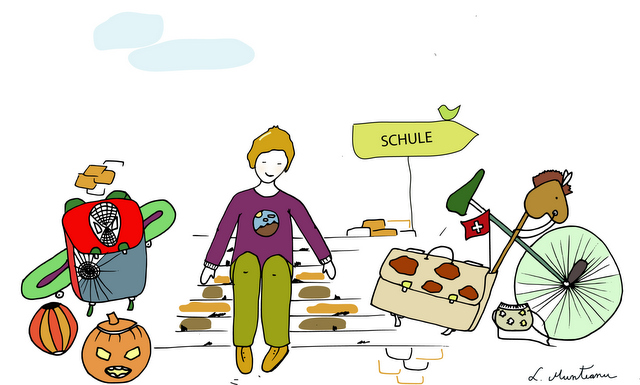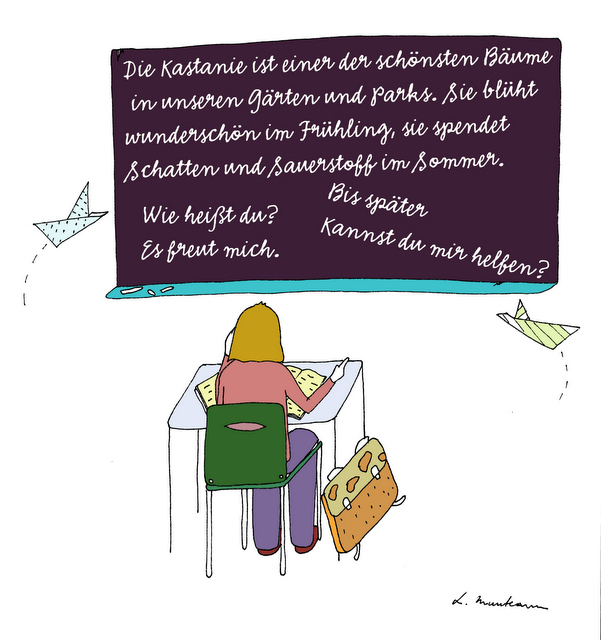Educating Your Children in Switzerland: The Local System
Mental health warning to readers: This article reports on challenges with the local schools from the perspectives of the mothers who experienced them. Some of this information can be discouraging, but I focus on ways to overcome the hurdles of living abroad, when they can be anticipated and conquered. My aim is to help neutralise the unexpected little stings you encounter in the journey towards balance and harmony in the education of our children. This issue’s column focuses mainly on challenges with the schools in canton Zurich. It will be followed by a column focusing on private school issues and finally by a column offering solutions and options for parents.
Part One: The Local System
For families who have more than one child, school fees in Switzerland might make the advantages of a fairly transparent and familiar English-speaking education in a known language an unreachable luxury. Some simply refuse to move here unless the cost of an international or bilingual education is included in the relocation package. Others leap in anyway, determined to swim and not sink, and committed to supporting their children’s integration on their own if all else fails. Try to develop a timeline with an expiry date for any experimental choices. Work out your fallback options before taking an unknown path and do your research well; non-German homeschooling is not allowed in the canton of Zurich, for example.
Some Parents and Children Have Difficulties
In German-speaking Switzerland I have heard much about the unanticipated difficulties when parents opt for local schools. Sometimes these are to do with a coherent but intangible social value system, which is reported to prevent innovation and modernity. Stories of invisible cultural rules abound, from requiring your child to change a new rucksack to a standard Swiss-style school bag, to advising you by text message if your child needs a wash. Offence caused may be inadvertent, but the general lack of good communication channels does not help.
Sometimes parents do not anticipate the differences that you do not perceive from the outward appearance of the well-maintained buildings and playgrounds in the public system. For example, there is a standard lack of supervision in the playground, which is perceived to promote independence even if a child can break an arm climbing a roof to retrieve a football without anyone noticing. Sometimes the differences are highly individual, and could happen anywhere, but misunderstandings are exacerbated by communication problems, especially if teachers refuse to speak English to parents.
International Anglophone-culture parents are surprised to encounter the formality of traditional Swiss state schooling after the relaxed Swiss kindergarten phase (of two years). Having one teacher for the first three years of primary school became a difficulty that outweighed the accompanying stability for one child I know, when his teacher proved old-fashioned and politically opposed to catering for more able children, rather than offering every child the same opportunities. Class teachers are often given complete independence of operation in Swiss schools. This family’s only option, if they could not find an acceptable solution, would have been to send their two children into different school systems, one private and one public.
Later on in the local system, many parents are aghast when they realise the implications of the strong academic/vocational split between Swiss secondary schools, which presents a huge hurdle at the age of 11 or 12. The Gymiprüfung (entrance exam for the Swiss high school, or Gymnasium) divides children and sends them to different schools after the sixth class, according to their abilities. There is another test point after the eighth and ninth classes that gives access to an academic education, but given the influence of peers at this age, many feel the long route is the surest to a University level education, in Zurich at least.
In terms of negatives reported for this issue, the most problematic area appears to be language. Children need time to learn a new language; allow a year to learn to speak German in the Swiss system, as day schools are rare. In any state school communication is easier en masse, so ensure that you try to speak as much as possible in person with your child’s teachers so they will understand your language level and relate to you and your child as individuals.
Local Language/s: German and the Swiss German dialect
Standard written German (or High German as it is sometimes known) is what your child will need to succeed at school. However, many parents choose to send their children to Swiss preschools and kindergartens where the dialect is spoken, thinking that this will help them to socialise, integrate with Swiss society and of course learn German. It is not quite as easy as that.
An English mother, Liz, arrived in Switzerland with good standard German herself and put her two eldest children into the local school system seven years ago. She loved the kindergarten, valuing Swiss cultural norms such as walking independently to school, and having lunch at home as a family. She also appreciated the class being divided into halves, which creates manageable class sizes. However, learning the local language was not nearly as easy for her children as she had anticipated, which overshadowed her oldest son’s entire primary education. “He went from being a proficient talker in English at age four to a child who had to concentrate on observing, but not really listening, and whose self-perception became that of a non-speaker,” she reports. This mother comments that speaking German remained a challenge for both her boys for years, even though they were so different temperamentally. Some kindergartens have extra German lessons, which might help.
There are several resources available for parents who are unsure of the risk factors when deciding on the education of their children. Certainly there is no need, given the reported experiences of many expat parents, to dive blindly into a linguistic experiment.
● You can apply to join the Yahoo! group Swiss Schooling, where you will find many useful comments about parents’ experiences.
● There are private Standard German courses for children on Wednesday afternoons. If your child is under seven, local school is part-time, so there is a lot of time to engage in weekly Swiss German-speaking cultural activities as well.
● Liz recommends a book site called Antolin, which encourages reading in German from first to tenth class.
● She successfully convinced the teacher of her first son to support an application to Universikum, a programme that offers a more diverse curriculum than standard school classes.
● Her second son was allowed to read German when the other children were doing English. You will help your children socially as well as practically by learning standard German yourself.
● Coaches and consultants such as Sandra Hilber can advise you on your options, for a fee.
● When children change schools in the Swiss system, they may favour staying with friends over understanding the different opportunities each school offers. Arm yourself with information about the different types of schools and the education pathways available to your children. Here are two resources:
- Ready, Steady, Zurich! Several proponents of local education who have put their own children into the system present information on this topic.
- Going Local – Your Guide to Swiss Schooling, by Margaret Oertig. A new book covering education throughout Switzerland. You can read our review here.
By Monica Shah
Monica is an early childhood specialist and founder of Children First Association in Zurich, a non-profit association for international families living abroad with young children.
Illustrations by Laura Munteanu
Laura studied journalism and advertising and has worked as a journalist and an illustrator. She has illustrated for magazines, websites, charity, and diverse campaigns. She lives in Zurich with her husband and eight-year-old daughter.
Photo by Lara Friedrich
Lara has been a freelance illustrator for Mothering Matters since early 2013. She is in her third year of University (majoring in Psychology) where she’s currently working as an assistant in a research project in pedagogy. Lara is also an assistant translator from German to English for various fiction books, and also works as a demo singer for the songwriter Kate Northrop.







In response to Liz’s son’s becoming a listener rather than a keen speaker: I have heard that it takes up to six years for a child to really become fluent in a language even when fully immersed. One has to remember that this new language might change a child’s personality in what seems to be a negative way, but it may later bring positive rewards for the child such as greater tolerance toward other cultures and better understanding of his own strengths and weaknesses–metacognition. I wish him good luck in the future!
Thanks! I think the (equal) fluency may take a lifetime, but I appreciate the positive thoughts.
This article aptly describes the up’s and down’s of the local school experience!
It also shows just how different the system is from what you might be used to, in particular when it comes to cultural norms (level of supervision, level of teacher interference) and what Monica describes as the academic/vocational split after year 6. Parents who are planning to send their children to local school need to be very open minded about the different pathways in the Swiss education system. As Monica is saying, make sure you get a good insight into the system beforehand!
I often get asked by parents, how ‘good’ Swiss schools are. The answer is that while the overall quality of schooling is good, it very much depends! It depends on your child, the teacher and the classmates. I have met quite a few happy Expat children in local schools but there are also those who struggle. Setting yourselves a deadline, as Monica suggests, is certainly a good idea!
Stefanie (Education consultant)
Dear Stefanie, Well said! Thanks a lot for your input.
We have recently moved to Switzerland and are trying to navigate our way around the Swiss school system (Zurich). I would love to talk to an education consultant who can talk me through the different school options and also give me guidance as to which school would be best suited to my children. Please do let me know if you can recommend anyone (I tried the link above for Sandra Hilber but it didn’t work). Thank you!
Sure I am happy to help. How old are your children?
Monica
Hi I also just moved to Switzerland and I would really appreciate some “consultation” I have two boys. A very bright and vocal 4 year old- he speaks English and understands some Farsi. He will start Kindergarten in a September I believe. And I have a 19 month old. I am very nervous about my son starting Kindergarten.
You can contact me via the Children First website, the link is in my biographical information above.
We are also available Monday – Friday 8am – 6pm on 044 252 9121.
Are you based in Zurich?
Hi there
I really appreciated this article and all the details around the school life, particularly talking about these text messages we can sometimes receive or other bizarre news through different channels.
I’m french, I lived in Zurich before for work then moved to England then France. And my partner and our 2 kids (7 years old to be in april 2018 and the other one will be 4 next october) are planning to move back next year. Because we already lived in Zurich, as well in Geneva, we well know the change in culture can be very shocking.
We re already looking at options for our kids. And from what I understand there are really three options here:
– private schools but not everybody can afford them and we can sometimes be disappointed by the amount of kids with bad behaviours found in them
– regular swiss schools with some extra support like private german classes each week but this can seem a bit harsh
– integration classes named “aufnahme classe” which appear to be present in each kreis in Zurich and are mainly based on learning german and getting prepared to integrate a regular school
Please can you tell me if I’m right?
What I wasn’t able to find is if these integrations classes are public or private and the cost of them as well as a list of these schools, as we will probably try to find an accomodation regarding the school itself.
Finally I also read that school is part time for kids under the age of 7 so does that mean I will have to work part time myself to take care of my kids or is there different schools with different rules?
Thank you very much.
Hi Sandra, In the public school system in a regular school, kids would have the opportunity to visit DAZ lessons (Deutsch as Zweitsprache) and it wouldn’t cost extra. If your child could play a sport with a local club or do another activity, that will help the language acquisition and the integration.
The 3-yr-old should have time to learn some German by visiting a Spielgruppe or daycare before he goes to kindergarten. The 6-year-old would most likely be going in to grade 1 when he’s 7 in the next school year. An option the school might suggest is that s/he does 1 year of kindergarten first to help with German. Here it’s not weird when kids stay back a year.
If you are certain you’re moving here, start with German now with a private lesson or find a German-speaking babysitter who can read them books and speak to them in German. There are also lots of apps too.
Kids do go to school part-time until grade 3. Even then they’ll have every Wednesday afternoon free and will have every lunch time free to come home for lunch. Check to see if the area you’re going to live in has a school with a Mittagstisch so the kids can stay at school for a cooked lunch…If you have further questions, get back in touch and when can post the question on our Facebook page for our readers to answer. All the very best.